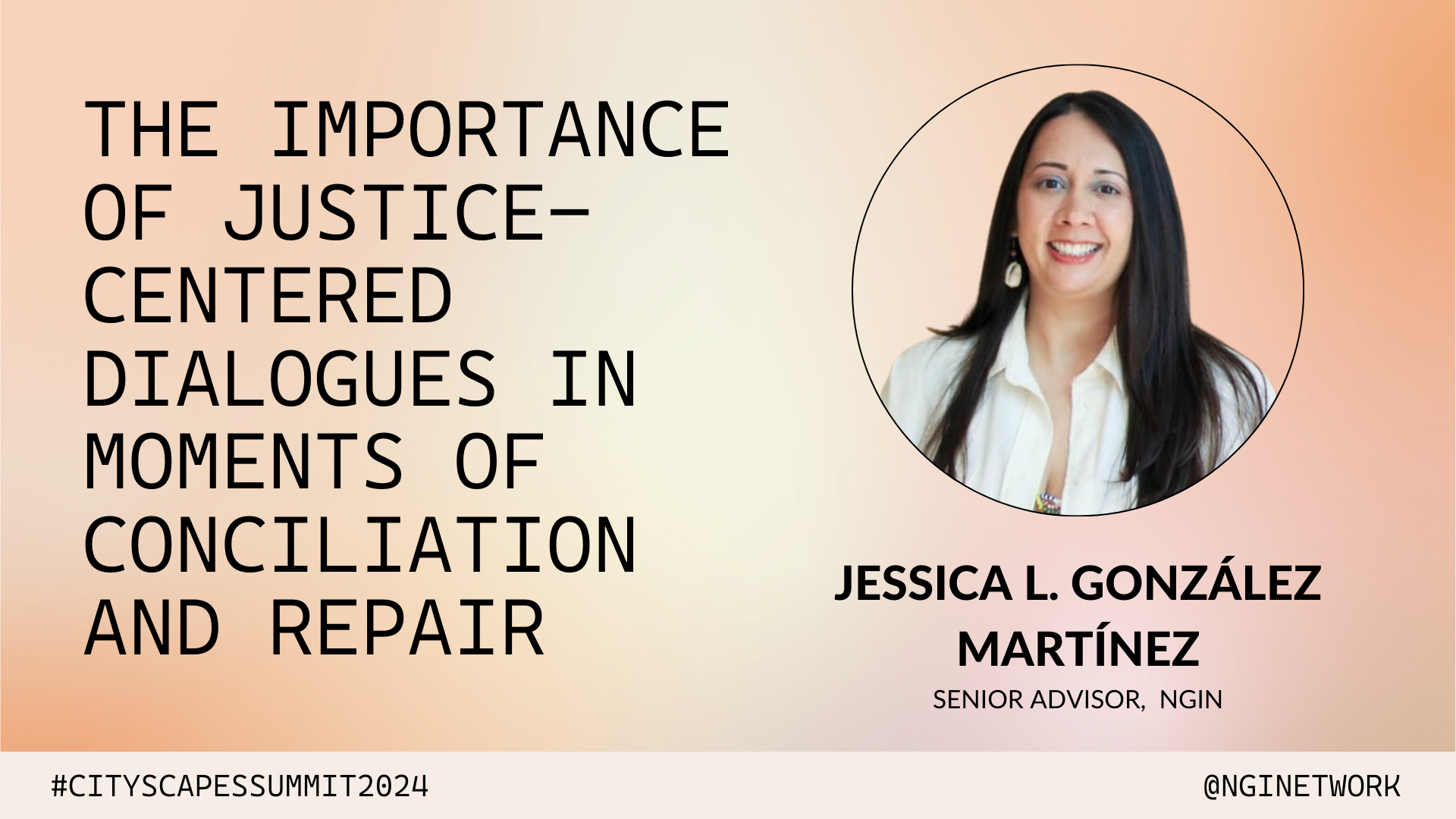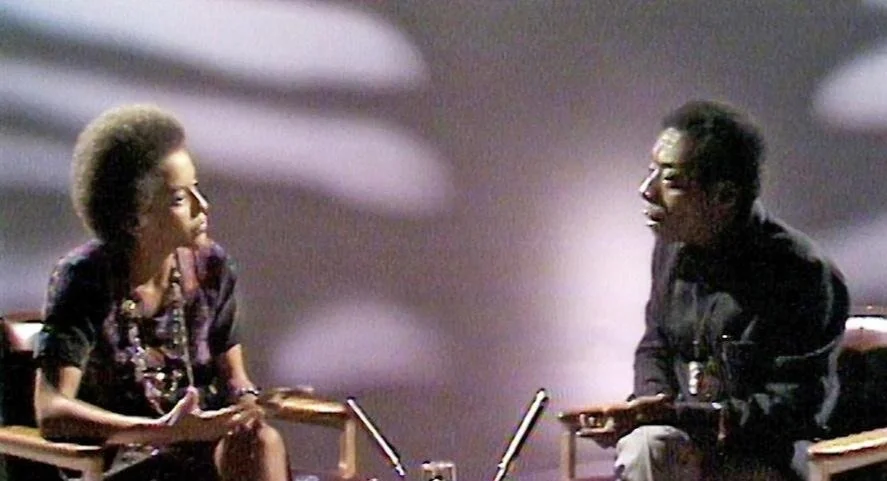The Importance of Justice-Centered Dialogues in Moments of Conciliation and Repair | Cityscapes Insights Series
Written by Jessica L. González Martínez
This insight piece, written by a Senior Advisor at NGIN, is based on sessions led by speakers from various organizations at the Cityscapes Summit 2024.
The 1971 dialogue between James Baldwin and Nikki Giovanni created a rich discussion on the television show “Soul”. It served as a significant cultural, and intellectual exchange exploring race, love, gender, and the experiences of African Americans. What is rejuvenating about this conversation is it sought to inspire and model how we courageously face each other and speak revolution in systems. It decenters popular nomenclature and activates the intellectuality of community.
Pictured above: James Baldwin and Nikki Giovanni
The Cityscapes Summit was designed to create a similar space for bold and courageous dialogue. The sessions, Seeking Truth & Reparations in Small and Midsized Cities and Language Justice: How Do We Talk About Inclusive Economic Development anchored a new way of convening policymakers and practitioners of economic development. One that did not focus on the solution and instead activated a container which brought voices, experiences, and aspirations for change to the forefront of the conversation.
The reparations session brought to light the necessity, intensity and vigor of voices like Kirsten Mullen, Trevor Smith, and Dr. William Darity, passionate leaders who advocate for reparations for African Americans in the U.S. The dialogue recognized attempts made by local municipalities to pilot reparation style programs, including Evanston, IL; Providence, RI; and Amherst, MA. It also explored the diverse philosophies driving reparations: building movements vs. activating policy change at the federal, state or local level.
Dr. Darity and Kirsten Mullen shared similar sentiments that not all advocates for redress for Black American descendants of U.S. slavery believe city and state-led programs are true reparations. Many believe these should be called racial equity initiatives since they do not promote comprehensive Black reparations. In comparison, Trevor Smith proclaimed that there is a fundamental necessity to develop these programs as a means to build momentum for a national wave of conciliation that tips the advantage of enacting a national policy shift toward reparations.
There was synergy among the speakers that a proposed bill for reparations can be calculated in at least one of two ways. One practice is to enumerate harms inflicted on Black Americans, assign a monetary value to each harm, and sum it up. This could include specific catastrophic events occurring in a given community, such as the destruction of Black Wall Streets.
Another approach is to identify a summary measure that captures the cumulative intergenerational impact of white supremacy on living Black Americans whose ancestors were enslaved in the United States. One example of such a measure is the racial wealth gap, which could be used to gauge the minimum size of the amount due to meet the nation’s debt.
As I reflect on the movement to enact reparations across the nation, it has become clear to me personally that a strategic approach to convene, ideate, and implement programmatic efforts is essential in small and midsized communities. Strategies, programs, and tactics must be tailored to the unique circumstances defining the legacy and experiences of Black Americans in each city. What offers repair in one city may not have the same impact in another; some communities need more time to assess and define the reparative measures required to address the racial wealth gap. Any significant program must prioritize the role of community voice and its power to drive and lead these efforts.
The session on Language Justice was in harmony with the dialogue on reparations. Sterling Johnson of Partnership for Southern Equity – a principled leader and mobilizer of economic justice throughout the American South reminded us that “...there is no monopoly in knowledge.” Sterling and I discussed the need to make a disruptive paradigm shift that moves away from traditional economic development reforms and shifts toward informed, intentional activations which apply cultural respect and power sharing that builds competency to engage and lead alongside community. It ensures we are not prescribing growth at the expense of people who remain at the margins of a local economy.
So, where can we start especially when crafting economic development polices, strategies and programs that are justice-centered? Here are a few suggestions:
Identify who is centered in the language being used.
Certain words or terms may have cycled through multiple cultural identities, resulting in their current use, no longer having what it originally intended to serve or describe.
Acknowledge whose growth is being described.
Economic development cornerstone measurement is economic growth. Yet the larger the geographic area that is being measured the more monolithic the measurement becomes, and it may not clearly detail who is benefiting from the growth.
Be aware of how language plays a role in building alliances with community.
Oftentimes groups identified as grassroots, neighborhood-level, and community-based lack the will to partner with economic development strategies solely on language use. Assessing jargon and language gaps is critical to aligning efforts.
Challenge yourself to build language muscle that speaks to a liberated future for all those left behind in the traditional economy.
This may be the hardest for practitioners to realize as a practice. This will require truth and reconciliation that creates a path to move forward. Many economic development strategies fail to actualize this process and later question why their communities have not identified resiliency in their economies.
I bring us back to Baldwin’s and Giovanni’s dialogue, where Baldwin declared, “The act of writing, the intention of it, the root of it, is liberation.” Capturing the profound commentary, audience participation, and the opportunity to create a liberated mind is what occurred at the Cityscapes Summit across these two sessions. Expressing that in writing is equally important as we must all be inspired to grow if we seek to materialize justice-centered economic growth.
Want to watch sessions and view presentations from the Cityscapes Summit 2024?
You can now access a selection of recordings, presentations, downloadables and book recommendations from the summit on our post-event resources page.


